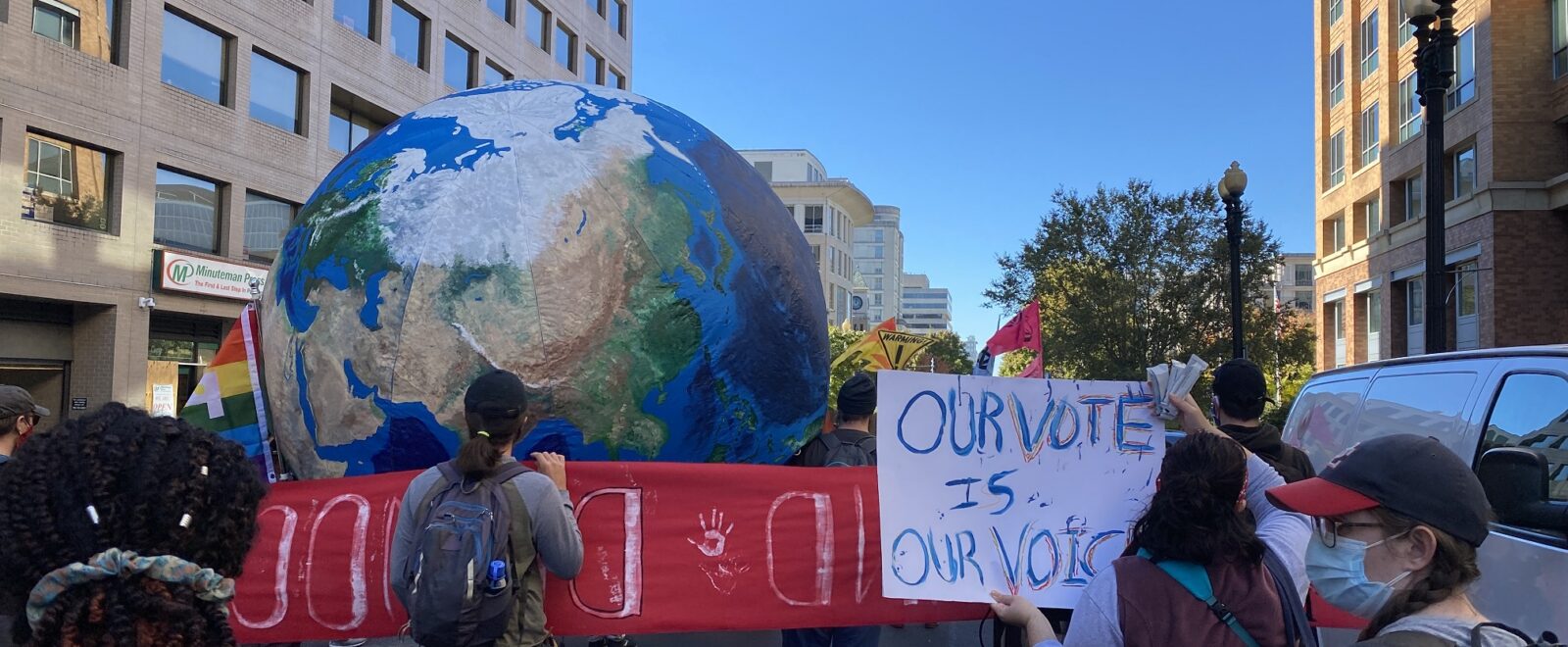The day after Election Day, with the results still unknown, the Trump administration formally withdrew the United States from the Paris Agreement on climate change. The U.S. is the only country in the world to withdraw from this agreement, the only framework for globally coordinated action to solve the climate crisis.
We congratulate President-Elect Biden and Vice President-Elect Harris, and strongly support their intent to rejoin the Paris Agreement as quickly as possible, as well as their intent to make addressing climate change a priority across all aspects of government. We are excited to see that the Biden team seems to understand that merely rejoining the Paris Agreement is not itself sufficient, and that it must be backed up by deeper action.
How U.S. climate policy affects the entire world
As an organization focused on the impacts of climate change on some of the most vulnerable communities in the world, we know that there is no such thing as domestic climate policy. What the world’s largest historical greenhouse gas emitter does to address climate change impacts the rest of the world; it is not simply a question of national concern. We also know that solving the climate crisis will require international cooperation on an unprecedented level – which means breaking out of traditional foreign policy approaches centered on “national security” and realpolitik. Instead of competition and mutual distrust between nations, we need mutual support and solidarity among global human society. (More developed thinking about what this should look like can be found in the Feminist Foreign Policy and Feminist Green New Deal platforms, both of which ActionAid supports.)
The eyes of the rest of the world are on the United States, as they fervently hope that a new administration can rein in our addiction to fossil fuels and step back from the dangerous abyss of Trump-style “America First” politics. U.S. climate policy, for better or worse, has impacts on the entire world (here’s a representative piece from colleagues in India), and we must design that policy with this in mind.
The Biden administration’s approach to climate policy should be based on the idea of shared humanity across borders. Above all, this means the United States must be a good partner in the common struggle against climate change. Empty rhetoric, bullying tactics against poorer countries, and undermining the ambition of international agreements has been the core of U.S. climate diplomacy over the past several decades. The Biden administration must change this immediately. If the United States wants to be seen as the “climate leader” it has often claimed to be, the Biden administration must ensure that we actually do our fair share to solve the climate crisis.
The U.S. Fair Share
In the lead-up to the negotiations that finalized the Paris Agreement in 2015, ActionAid and many allied organizations and social movements from around the world published an analysis of the level of climate action that each country should have committed to under that agreement. This was known as the Civil Society Equity Review of the climate action pledges (“Nationally Determined Contributions,” or NDCs) that countries submitted during the negotiations for the Paris Agreement. The Equity Review found that the Obama administration’s pledge for the United States was 5-6 times weaker than it should have been. Most other rich industrialized countries similarly fell short of their fair share, while developing countries – including much-maligned China and India – largely committed to action much closer to their fair shares.
This, of course, was before already inadequate U.S. climate action fell off a cliff after the election of climate-denying Donald Trump. After four more years of complete inaction and continued climate pollution, our fair share is significantly larger than it was when we entered into the Paris Agreement. According to a forthcoming analysis by us and our allies in the US Climate Action Network, based on the same methodology as the Civil Society Equity Review, in order to meet our fair share the United States must do the equivalent of reducing our emissions by 195% by 2030 (compared to 2005 levels).
In practice, of course, we cannot reduce our emissions by much more than 100%, at least not without resorting to dangerous and unproven “negative emissions technologies.” To meet this fair share, the United States must instead reduce our emissions by as close to 100% as possible, and then make up the rest by providing financial and technological support to enable correspondingly large emissions reductions in developing countries beyond what they could do otherwise. In other words: international cooperation, and large transfers of resources to poorer countries, will be absolutely essential to solving the climate crisis, and is a core part of the U.S. fair share.
Can the U.S. really be a climate leader?
This is what the Biden administration must work towards. It is a significantly larger commitment than simply rejoining the Paris Agreement. It would go a long way towards newly establishing U.S. credibility on climate action, allowing us to become a “climate leader” in reality, not just in rhetoric.
And in that sense the U.S. exceptionalists are correct: the world does need us to be a climate leader – because it needs us to pull our weight. Only with the U.S. doing our fair share – which means taking ambitious and equitable climate action at home and providing financial support for similar transformations in poorer countries – will the Paris goals be achievable in the real world and not just nice words on paper.

